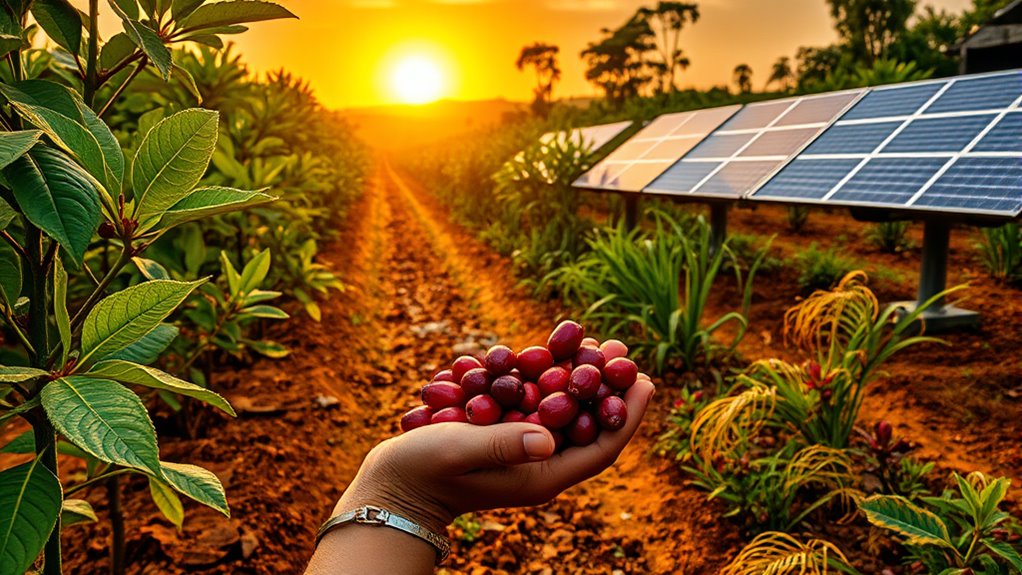Sustainable coffee matters for the future because it supports the environment, boosts local economies, and enhances biodiversity. By choosing sustainable coffee, you’re helping to improve soil health and lower carbon footprints. It also guarantees fair wages for farmers, fostering better livelihoods. As consumer demand for transparency grows, brands that prioritize sustainability thrive. This movement contributes to climate resilience and offers collaborative solutions for coffee producers. Want to discover more about how you can make a difference?
Key Takeaways
- Sustainable coffee production protects the planet by reducing greenhouse gas emissions and preserving ecosystems essential for future generations.
- It promotes economic stability for farmers through fair wages and higher market prices, improving livelihoods and local economies.
- Adopting sustainable practices enhances biodiversity, leading to healthier ecosystems and increased resilience against climate change.
- Consumer demand for transparency fosters eco-conscious brands and strengthens the coffee supply chain, ensuring ethical sourcing.
- Collaboration among stakeholders, like the Sustainable Coffee Challenge, drives innovation and shared knowledge for sustainable practices in the coffee industry.
The Importance of Sustainable Coffee Production

When you choose sustainable coffee, you’re not just enjoying a great cup—you’re also supporting practices that protect our planet.
Sustainable coffee production is essential for mitigating climate change and conserving natural resources, ensuring the longevity of coffee farming in areas vulnerable to shifting climates. By adopting sustainable practices like shade-grown techniques, you help enhance biodiversity and promote soil health, which leads to higher-quality beans and resilience against environmental challenges.
These methods also reduce greenhouse gas emissions and preserve natural ecosystems. In addition, certifications like Fair Trade and Rainforest Alliance guarantee fair wages for coffee producers, fostering social equity and empowering local economies.
In short, your choice makes a significant impact on the environment and supports the livelihoods of those who grow your coffee.
Economic Benefits of Sustainable Coffee Practices
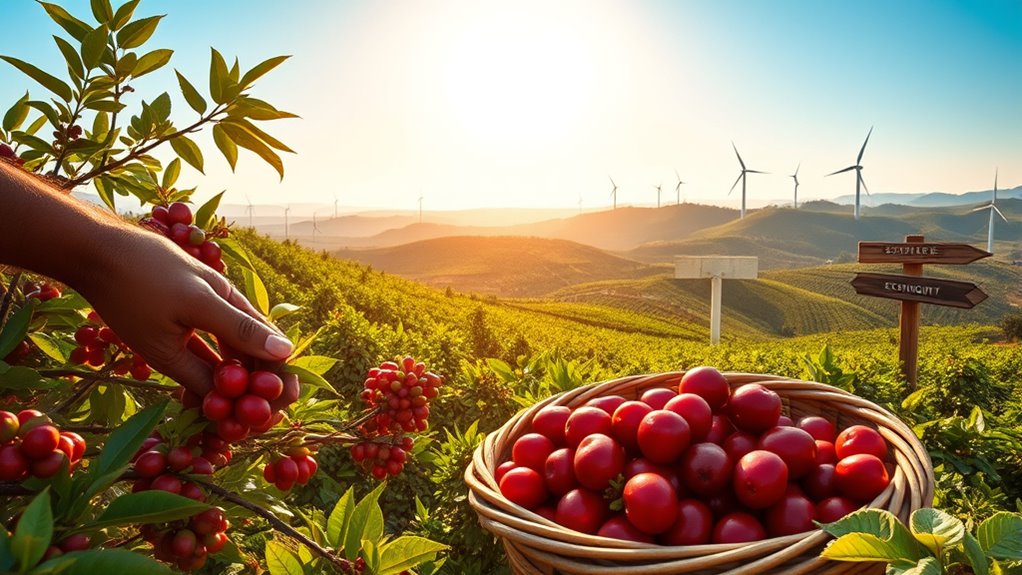
Although many might think of coffee solely as a beverage, the economic benefits of sustainable coffee practices extend far beyond your morning cup. By embracing sustainable practices, you support coffee farmers and their communities, leading to lasting positive impacts.
Here are some key economic benefits:
- Higher net returns from sustainable production compared to conventional methods.
- Enhanced soil health, reducing costs for synthetic fertilizers.
- Improved livelihoods through fair labor practices.
- Higher market prices for better-quality beans from sustainable methods.
- Increased investments from collaborations like the Sustainable Coffee Challenge.
These benefits illustrate how sustainable coffee practices not only promote environmental health but also foster economic resilience for coffee farmers and their communities.
The Role of Consumer Awareness in Shaping Sustainability

Consumer awareness plays an essential role in shaping sustainability in the coffee industry, as your choices directly impact how coffee is sourced and produced.
When you prioritize sustainable coffee, your consumer demand encourages brands to adopt ethical sourcing practices, like those certified by Rainforest Alliance and Fair Trade. This shift fosters transparency in the coffee supply chain, as companies become more aware of the importance of clear labeling and sustainable farming methods. Additionally, the rise of eco-conscious brands emphasizes the need for ethical practices in all sectors, including coffee. Furthermore, the growing emphasis on efficient payment solutions can enhance the transparency and traceability of sustainable coffee transactions. Sustainable practices often lead to improved investment returns, as consumers increasingly seek out brands that reflect their values. As more brands adopt renewable practices, they contribute to a broader movement towards sustainability in agriculture.
As you and other consumers become more mindful of your purchasing decisions, you create a positive feedback loop that drives innovation and sustainable practices among coffee producers.
Ultimately, your informed choices can lead to significant changes, enhancing environmental and social outcomes in the industry. The increasing focus on sustainable products influences market trends across various beverage sectors, including coffee.
Collaborative Efforts in the Sustainable Coffee Challenge
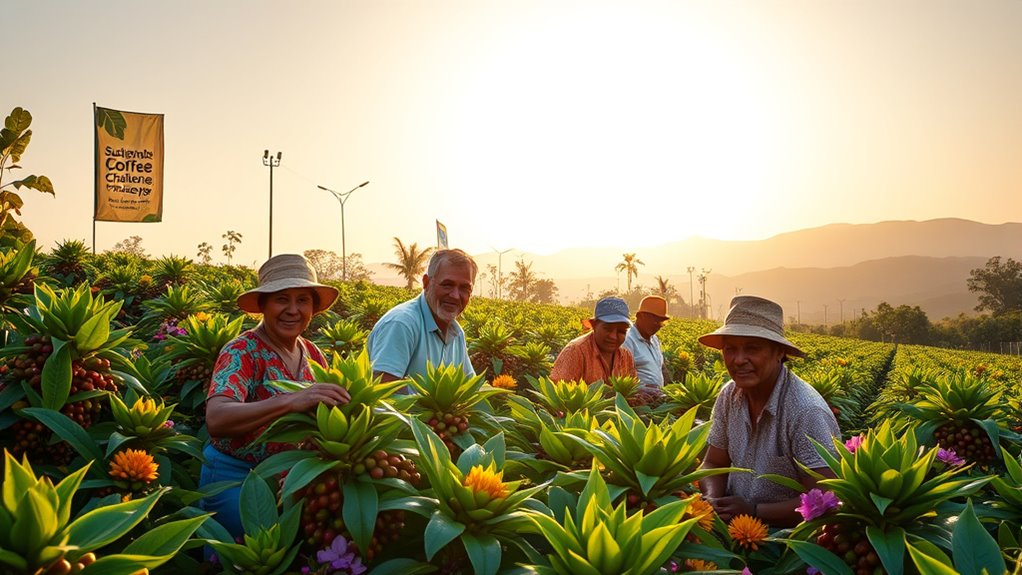
In the Sustainable Coffee Challenge, you’ll see how industry partnerships can drive real change in ethical sourcing practices.
By collaborating, everyone from growers to retailers can share innovative ideas that promote sustainability.
Together, we can transform coffee into a model for responsible agriculture that benefits both the planet and its people.
Industry Partnerships for Change
As the coffee industry faces mounting challenges like deforestation and climate change, collaborative efforts through the Sustainable Coffee Challenge are proving essential for driving meaningful change.
By uniting over 155 international partners, including major companies like Starbucks and Nespresso, this initiative promotes sustainable practices that enhance the livelihoods of coffee producers.
Key aspects of these partnerships include:
- Knowledge-sharing among stakeholders
- Innovation in sustainability methods
- Emphasis on ethical certifications like Fair Trade
- Addressing critical supply chain issues
- Collective action towards a fully sustainable coffee sector
This collaboration not only raises awareness about sustainability but also reinforces the industry’s shared responsibility to create a sustainable supply chain, ultimately benefiting millions of farmers worldwide.
Ethical Sourcing Practices
While many coffee lovers may not realize it, the journey from bean to cup involves a complex web of sourcing practices that can greatly impact both the environment and the lives of farmers. The Sustainable Coffee Challenge unites over 155 partners to promote ethical sourcing and sustainable practices. Major companies like Starbucks and McDonald’s are leading the way by committing to verified sustainability standards. Certifications like Rainforest Alliance and Fair Trade guarantee ethical labor practices in coffee production. Collaborative efforts with organizations such as Conservation International raise awareness of the social and environmental impacts of coffee.
| Partners | Sustainability Efforts |
|---|---|
| Starbucks | Verified sustainability |
| McDonald’s | Ethical sourcing initiatives |
| Conservation Int. | Awareness and solutions |
| Growers | Improved livelihoods |
Innovation in Sustainability
Innovative approaches to sustainability are transforming the coffee industry, thanks to the collaborative efforts within the Sustainable Coffee Challenge. This initiative unites over 155 partners to drive demand for sustainable practices while addressing climate change.
Major players like Starbucks exemplify how large-scale collaboration promotes responsible sourcing.
Key aspects of this challenge include:
- Promoting sustainable farming practices
- Preventing deforestation and conserving biodiversity
- Enhancing income for coffee producers
- Integrating certifications like Rainforest Alliance and Fair Trade
- Raising consumer awareness about sustainable coffee sourcing
Impact on Biodiversity and Ecosystem Resilience
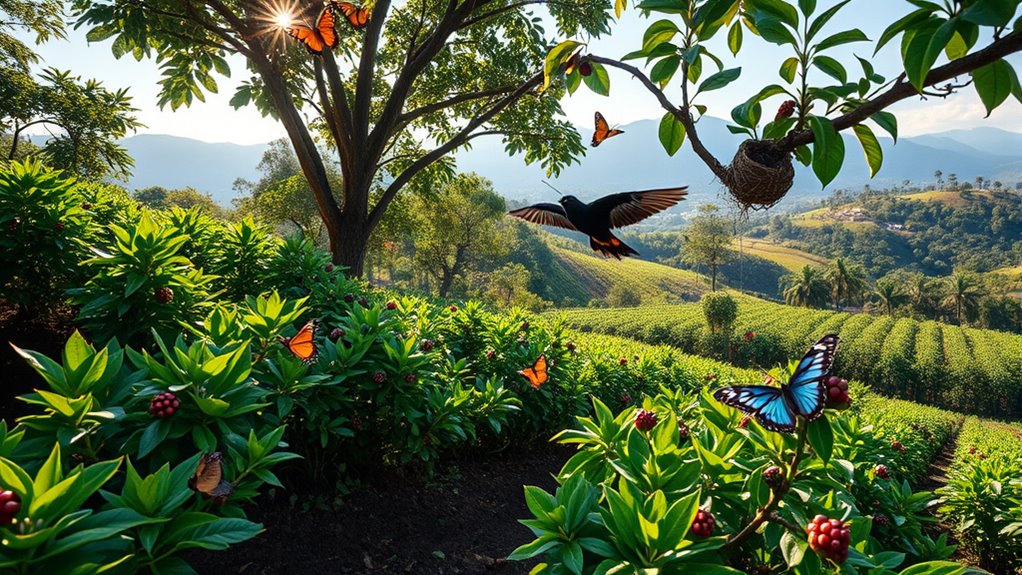
Sustainable coffee production practices greatly impact biodiversity and ecosystem resilience, creating a rich tapestry of life on coffee farms. By implementing methods like agroforestry and shade-grown systems, you’re fostering habitats for diverse species. This enhances biodiversity, leading to healthier ecosystems compared to traditional monoculture farming. Studies show that regenerative agriculture boosts species richness, which strengthens overall ecosystem resilience. Increased biodiversity helps with natural pest control and pollination, reducing the need for harmful synthetic pesticides and fertilizers. Additionally, these sustainable practices mitigate climate change’s negative effects, promoting ecosystems that can withstand extreme weather. By preserving native flora and fauna, you’re not just supporting coffee production but also enhancing the ecological integrity of farming landscapes for future generations. Moreover, the integration of renewable energy technologies in coffee production can further reduce the environmental impact of farming operations. Additionally, sustainable practices such as agroforestry methods can improve soil health, supporting the long-term viability of coffee farms.
Addressing Climate Change Through Sustainable Coffee Farming
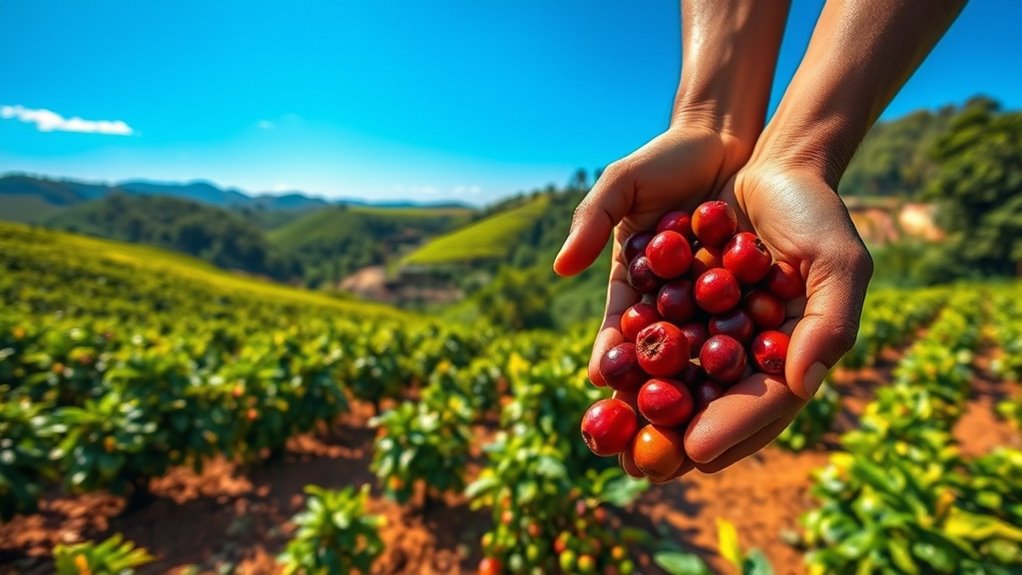
You can make a difference in the fight against climate change by supporting sustainable coffee farming practices.
These methods not only reduce the carbon footprint but also help local communities thrive.
Climate Resilient Farming Practices
As climate change increasingly threatens coffee production, adopting climate-resilient farming practices becomes essential for farmers looking to safeguard their livelihoods.
By implementing sustainable practices, you can enhance your coffee farms’ resilience and guarantee long-term viability.
Consider these effective strategies:
- Utilize shade-grown techniques to enhance biodiversity
- Integrate trees and cover crops for water conservation
- Adopt regenerative agricultural methods to reduce emissions
- Focus on improved soil health through organic fertilizers
- Participate in collaborative initiatives like the Sustainable Coffee Challenge
These approaches not only combat the impacts of climate change but also lead to higher net returns compared to conventional methods.
Reducing Carbon Footprint
While the coffee industry grapples with the challenges of climate change, reducing the carbon footprint through sustainable farming practices has emerged as an essential solution.
By adopting sustainable practices like shade-grown coffee and agroforestry, you can help sequester carbon, enhance soil health, and boost biodiversity. This shift not only lowers greenhouse gas emissions but can also reduce carbon footprints markedly—comparable to taking millions of cars off the road.
Engaging in sustainable coffee sourcing, as seen with companies like McDonald’s achieving 100% sustainable coffee in the U.S., highlights a collective effort to combat climate change.
Supporting Local Communities
Supporting local communities through sustainable coffee farming is essential for addressing the impacts of climate change. By adopting sustainable practices, you not only help the environment but also uplift local economies.
Here’s how supporting brands that prioritize sustainability makes a difference:
- Enhances biodiversity and soil health, fostering resilient ecosystems.
- Empowers over 3,700 farmers through training and fair trade practices.
- Reduces greenhouse gas emissions, contributing to a sustainable future.
- Guarantees fair prices for coffee producers, improving their livelihoods.
- Collaborates with organizations to protect biodiversity and promote conservation.
When you choose sustainable coffee, you’re investing in local communities and guaranteeing a thriving future for both farmers and the planet.
Frequently Asked Questions
What Is the Goal of the Sustainable Coffee Challenge to Make Coffee the World’s?
The goal of the Sustainable Coffee Challenge is to unite everyone in the coffee supply chain, from growers to retailers, to make coffee the world’s first fully sustainable agricultural product.
You’ll see stakeholders driving demand for sustainable practices that enhance environmental and social impacts.
What Will Happen to Coffee in the Future?
You might notice significant changes in coffee’s future. Climate change could make many traditional coffee-growing areas unviable, leading to reduced supply and higher prices.
If farmers don’t adapt, they may abandon coffee cultivation altogether. As consumer demand for sustainably sourced coffee rises, you’ll likely see companies shifting their practices.
This change could reshape the industry, but without sustainable farming, the livelihoods of countless smallholder farmers may be at risk.
What Are the Main Issues With Coffee Sustainability?
Imagine a lush forest, where coffee trees thrive like vibrant jewels among the emerald leaves.
Yet, beneath this beauty, unsustainable practices loom like shadows. You’ll find deforestation stripping away habitats, soil erosion washing away nutrients, and harmful chemicals poisoning water sources.
Climate change twists weather patterns, risking your morning brew. Economic hurdles trap small farmers, while your lack of awareness stifles sustainable growth.
It’s time you recognize the urgency of coffee’s future.
What Are the Environmental Benefits of Coffee?
When you consider the environmental benefits of coffee, you’ll find that sustainable practices greatly enhance biodiversity.
By choosing shade-grown coffee, you support habitats for various species. Agroforestry techniques reduce soil erosion and improve water conservation, which is essential for healthy ecosystems.
Plus, regenerative farming boosts resilience against climate change.
Finally, certifications like Rainforest Alliance guarantee that your coffee’s production minimizes environmental impact, helping to preserve natural resources for future generations.
Conclusion
Sustainable coffee isn’t just a trend; it’s a necessity for our future. Did you know that sustainable coffee farming can reduce greenhouse gas emissions by up to 50% compared to conventional methods? By choosing sustainable options, you’re not only enjoying a better cup but also supporting farmers and protecting our planet. Every sip counts! As consumer awareness grows, we can drive change together, ensuring a thriving coffee industry that benefits both people and the environment.
